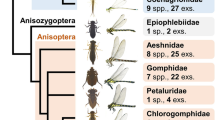Abstract
ALTHOUGH in the last quarter of a century a considerable amount of advance has been made in various parts of the world towards the classification and morphology of the imago of the family Psychodidæ, our systematic knowledge of the immature stages of the group is surprisingly scanty. This is perhaps due in the first place to the secluded nature of the breeding places of the members of this family, and secondly to the fact that, unless and until the complete life-history of each species is studied thoroughly in the laboratory, one is not in a position to place an egg, a larva, or a pupa to a particular species. While engaged in the breeding of sandflies at the Kala-azar Research Laboratory of the Calcutta School of Tropical Medicine and Hygiene, I had an excellent opportunity of studying the immature stages and more especially the larvæ of the species occurring locally.
This is a preview of subscription content, access via your institution
Access options
Subscribe to this journal
Receive 51 print issues and online access
$199.00 per year
only $3.90 per issue
Buy this article
- Purchase on Springer Link
- Instant access to full article PDF
Prices may be subject to local taxes which are calculated during checkout
Similar content being viewed by others
Author information
Authors and Affiliations
Rights and permissions
About this article
Cite this article
MUKERJI, S. Taxonomic Importance of the Terminal Segments of Psychodid Larvæ. Nature 125, 446–447 (1930). https://doi.org/10.1038/125446b0
Issue Date:
DOI: https://doi.org/10.1038/125446b0
Comments
By submitting a comment you agree to abide by our Terms and Community Guidelines. If you find something abusive or that does not comply with our terms or guidelines please flag it as inappropriate.



